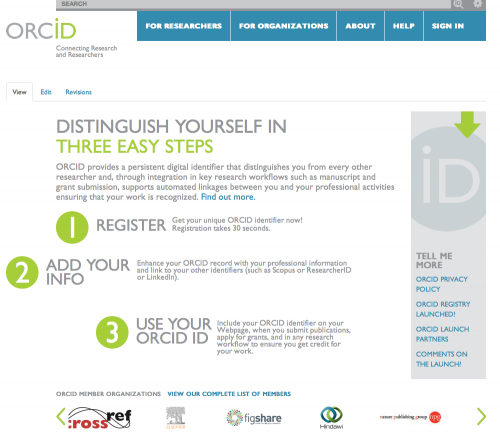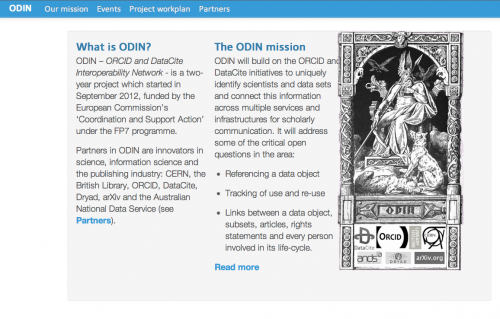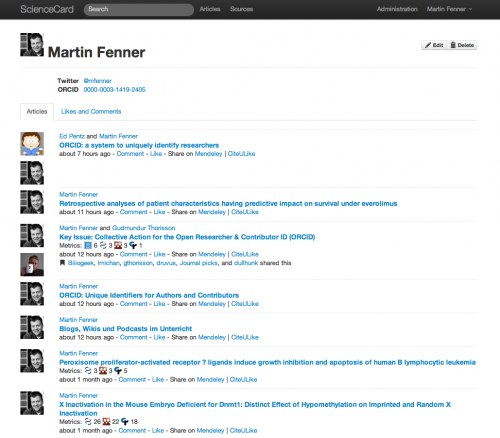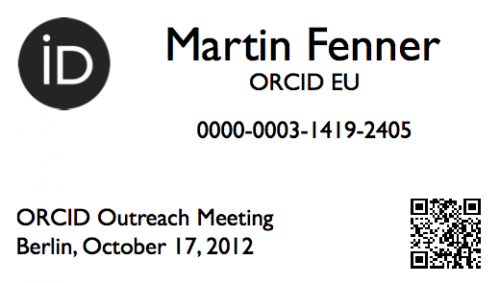Last week has been busy. I went to Berlin for the launch of the Open Researcher & Contributor ID (ORCID) service. ORCID allows researchers to obtain a persistent identifier that can be used to claim publications and other scholarly works. I’m 0000-0003-1419-2405, and we put the ID (and the QR code linking to the profile on the ORCID website) on the name tags for the ORCID Outreach Meeting last Wednesday (Geek alert: I also have received a T-shirt with my name, ORCID and QR code).
I was invited to work with ORCID in early 2010 after writing about the initiative that was started in November 2009 on this blog (ORCID or how to build a unique identifier for scientists in 10 easy steps). And now, after three years and a lot of work by a lot of people, ORCID is real and everyone can use the system. As a researcher, you can go to the ORCID website and register.

Obtaining a number is of course not very interesting in itself, few people get excited about the fact of having a 16-digit unique identifier. What ORCID is really about is claiming your publications and other scholarly works, and Connecting Research and Researchers is the slogan of the organization. In the ORCID system you can now claim publications found in the CrossRef database, and other work types will be added over time.
What I’m particularly interested in is the claiming of research datasets. Everyone wants to give researchers better credit for the data they have produced, transformed and annotated, but data citation is still not a widespread practice. I am therefore very excited to be involved in the ORCID and DataCite Interoperability Network (ODIN), a EU-funded project that had its kickoff meeting last week in Berlin.

In the ODIN project we will work closely with DataCite, an organization that provides digital object identifiers (DOIs) for research data. One of the many things I like about ODIN is that social sciences is one of the disciplines where we will build a proof of concept (with the British Library, the other discipline is high-energy physics and CERN). We also want to understand how to best link researchers, data and publications. Dryad is an ODIN project partner and obviously has a lot of experience linking biological datasets to publications, and we will discuss how to integrate ORCID identifiers into the workflow.
Unique identifiers for researchers are of course also an essential part of any work on article-level metrics. I spoke about this at the altmetrics12 conference in June, and I’m excited that we can now finally start linking things together. ImpactStory was one of the ORCID launch partners, and I demoed their ORCID integration last week in Berlin.
ScienceCard is a fork of the open source PLOS Article-Level Metrics application, and is a project I started about a year ago. ScienceCard allows researchers to list all their publications, and the metrics associated with them. With the launch of ORCID I was able to finally add one important missing piece. Through automatic lookup of the ORCID identifier and retrieval of the publications claimed in the ORCID profile is has become much easier to create and maintain a ScienceCard profile – it shouldn’t take more than 5 min and a few mouse clicks (collecting all metrics takes longer because that happens in the background). I added ORCID integration to ScienceCard over the weekend, using the free public ORCID API.

ScienceCard is a great tool to explore how research impact can be collected and displayed, and I appreciate feedback in the form of feature requests and bug reports, ideally in the GitHub issue tracker of the project. This will also provide very valuable feedback to improve the PLOS Article-Level Metrics application, as they use almost the same code base. The API is for example completely the same, rplos and other tools using the PLOS ALM API can be used with ScienceCard by just changing the URL. Another example is the PLOS ALM WordPress Widget, with minor modifications it can be also be used with ScienceCard, allowing a researcher to display the metrics for his publications from PLOS and other sources on his blog. The upcoming Altmetrics workshop and hackathon (November 1-3 in San Francisco) will be a great opportunity to explore this further.


